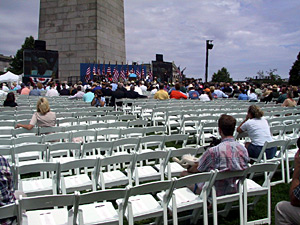Audio
Photos
Your Voice
| |||||||||||||||||||||||||||||||||||
Courting the veterans vote
July 27, 2004
 |
| Very few delegates to the Boston convention, and fewer than 100 veterans, showed up at the rally to honor veterans at Boston's Bunker Hill monument. (MPR Photo/Bob Collins) |
Boston, Mass. — Large photographs throughout the convention hall display Vietnam images with John Kerry in fatigues, on his gunboat, surrounded by his so-called Band of Brothers. But Kerry also headed Vietnam Veterans Against the War, a fact Republicans are only too happy to use to paint Kerry as "soft" on defense.
Longtime Democratic pollster Peter Hart acknowledges it's a challenge for Democrats to appeal to veterans.
"The active military person is usually more likely to be a Republican, certainly with the officers," says Hart.
 | |||
Tuesday's plan to salute veterans got off to a rocky start. Beneath dozens of flags and towered over by the Bunker Hill monument in Boston, the Democrats hoped to stage a rally that would show them as a party committed to -- and supported by -- veterans.
But peel away the speakers, the senators and House members and reporters, and fewer than 100 attended out of a convention of 6,000 delegates. That's indicative of how hard it will be for the Democrats to convince voters they are the party heavily supported by veterans.
Pollster Hart says it's worth the effort.
"I think if Sen. Kerry can get over 50 percent of that vote, it's going to be a good sign for Democrats, because what it's going to say is, 'This person is strong enough to be able to lead.' These people care about the strength and direction of the nation," says Hart.
But according to a CBS poll last month, Kerry is nowhere near getting 50 percent of the veteran vote. President Bush leads Kerry among veterans, 54 percent to 40 percent.
 | |||
In their opening salvos Monday night, Democrats focused more on promoting Kerry than savaging Bush. One exception was former President Jimmy Carter, who questioned how much time the president spent with the Texas National Guard during the Vietnam War.
And that's fertile ground for veterans like Jim Bootz of Chaska, who thinks this time, it should be the Republican whose wartime service is questioned.
"We haven't heard anything about George Bush's crewmates. I don't know if there were any," says Bootz. "We haven't heard anybody coming forward saying, 'Oh, yeah, I remember serving with him,' or speaking out -- his heroics or anything."
A squad of Republican politicians arrived in Boston on Tuesday to respond to the Democrats. They included Minnesota Sen. Norm Coleman, who criticized John Kerry's votes on Iraq.
"He's had seven different positions in a short period of time. Funding the $87 billion on body armor for our troops. In the end people aren't dumb, they're smart. They're going to focus on the record," Coleman says. "They're going to decide whether he has the strength and consistency to do what Joe Lieberman said, to make the tough decisions in the fight against terrorism."
 | |||
The mention of Iraq has been relatively scarce in Democratic speeches so far. Officials have eliminated references to it being a mistake. But a sizeable Democratic base believes it was, and Kerry forces face a challenge marrying the so-called peace element of the party with the veterans, who polls show support the decision to go to war.
Enter former Democratic presidential candidate Gen. Wesley Clark, who answered, "Who linked support for the war as a patriotic requirement?" by invoking the soldiers who stood against the British on Bunker Hill.
"They fought for freedom. They fought for the right to assemble, to dissent, to speak out, to give their views," Clark says. "And in a time of war, it is the highest form of patriotism to speak out and give those views across this country."
But as delegates streamed into Boston FleetCenter for the second night of their convention, it's Vietnam -- not Iraq -- that campaign officials want to discuss, largely -- it would appear -- with the occasional subtle jab of what Bush was doing while Kerry was serving. To underscore the atmosphere of the '60s, the folk group Peter, Paul and Mary perform Tuesday night.
|
News Headlines
|
Related Subjects
|

